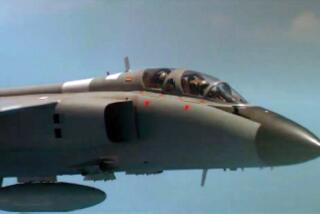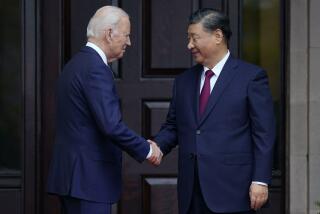Talks on Collision Unlikely to Alter U.S. Stance, Officials Say
- Share via
WASHINGTON — An eight-member U.S. delegation will open talks in Beijing this week on the collision involving a Navy spy plane amid signs that the American side intends to give little ground.
A group headed by Pete Verga, deputy undersecretary of Defense for policy support, is to begin talks with Chinese officials Wednesday covering the causes of the April 1 collision between the Navy EP-3 and a Chinese F-8 fighter, measures to prevent similar accidents and arrangements for return of the U.S. plane.
The American aircraft, on a routine surveillance flight off the southern Chinese coast, was forced to make an emergency landing. The 24-member crew was released after an 11-day diplomatic standoff that damaged U.S.-Chinese relations.
U.S. officials say they do not expect to change their views or to agree to reduce surveillance in the Pacific.
They say they remain convinced that the accident was caused by the recklessness of the Chinese fighter pilot rather than any action by the Navy crew. They insist that the U.S. side is not prepared to restrict flights that are legal and, in the American view, follow international norms.
“You can expect some forthright conversations about those flights and about what took place,” predicted White House Press Secretary Ari Fleischer.
“The United States will always reserve the right to operate over international waters and international airspace to protect the needs of our neighbors, promote regional stability and secure peace, which is why our nation and many other nations fly reconnaissance missions,” he said.
At the State Department, spokesman Richard Boucher hinted that the relationship between the two countries could be harmed if the Chinese use the meeting for polemics. The Chinese have insisted that the U.S. was responsible and that it discontinue surveillance flights.
But Boucher said the Chinese have advised Washington that “they intend to take a non-polemical and straightforward approach” to the meeting.
“We have made quite clear that we think that a productive meeting can set the basis for our further relationship. On the other hand, a polemical meeting would give us some indication of how they might or might not intend to proceed with the relationship,” Boucher said.
Some officials said privately that they were skeptical that the meeting will produce much more than an exchange of well-known views. They speculated that more substantive negotiations on the issues may take place later, and more privately.
It is not clear how long the talks will last, officials said. They could last “a couple of days,” Boucher said.
One U.S. official said the surveillance flights might resume as soon as the negotiations end later this week.
More to Read
Sign up for Essential California
The most important California stories and recommendations in your inbox every morning.
You may occasionally receive promotional content from the Los Angeles Times.











